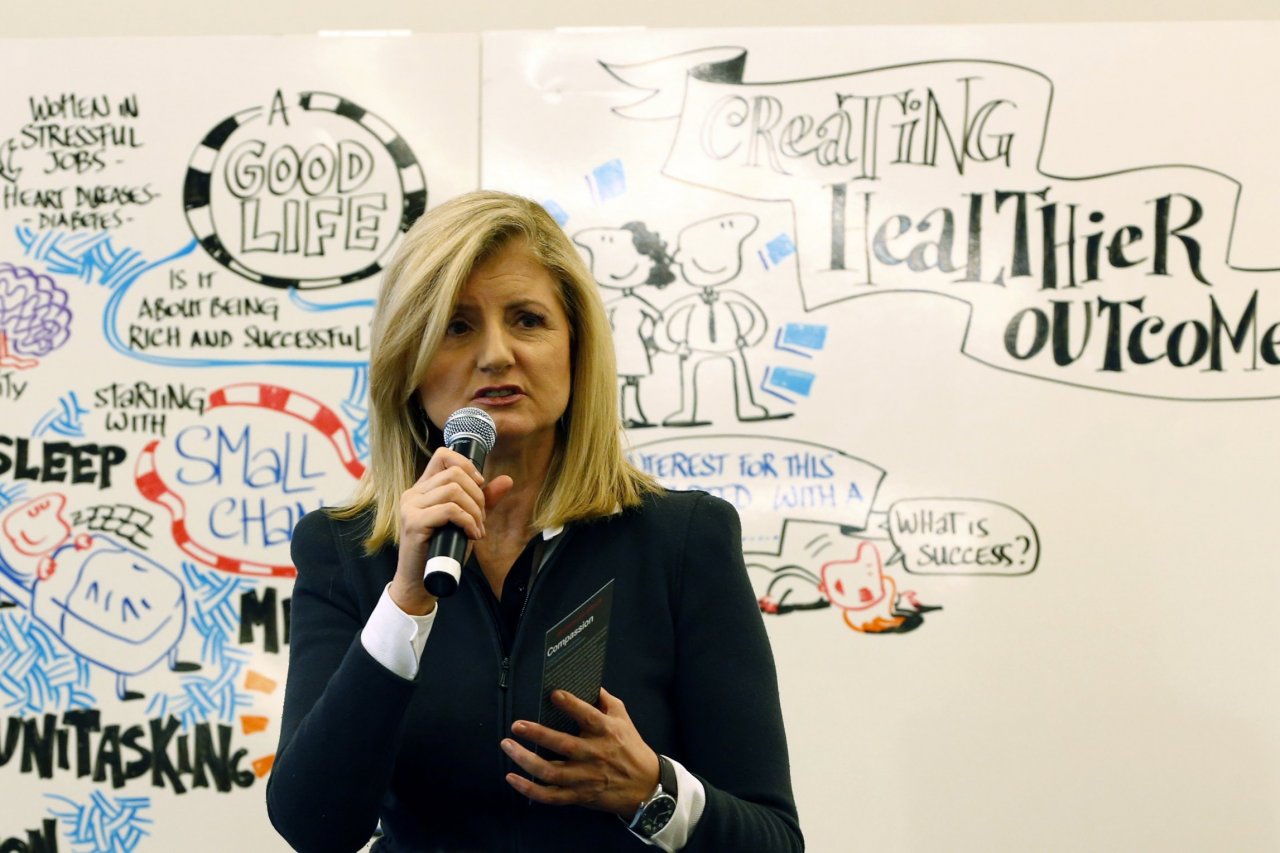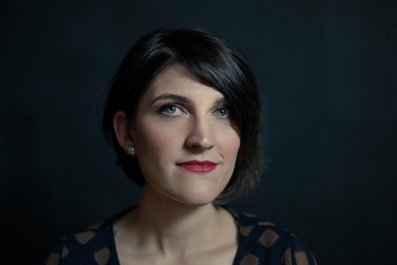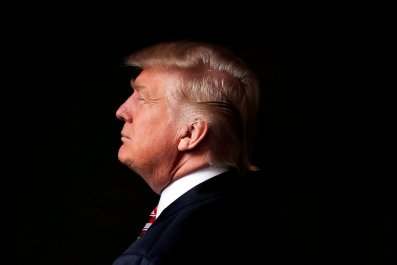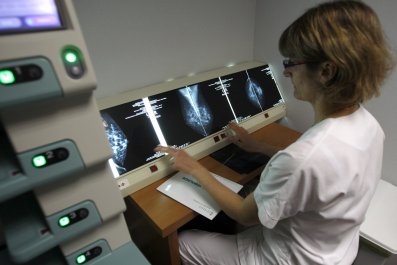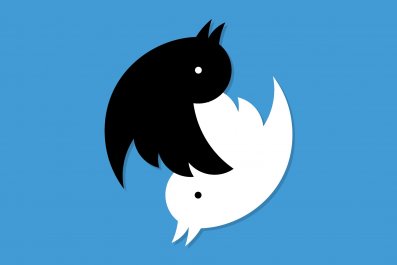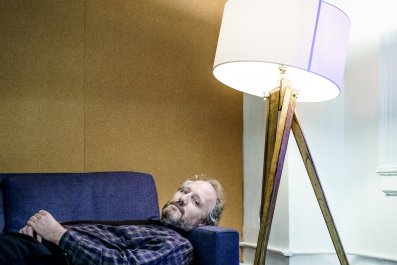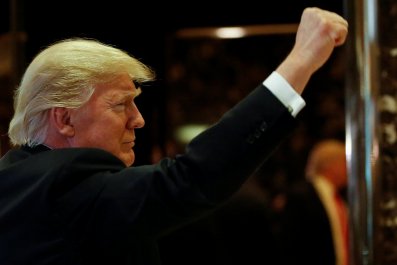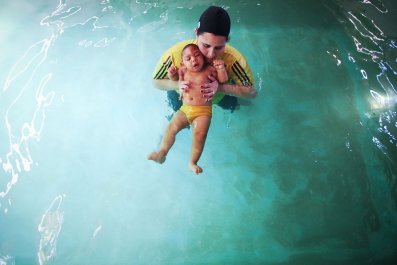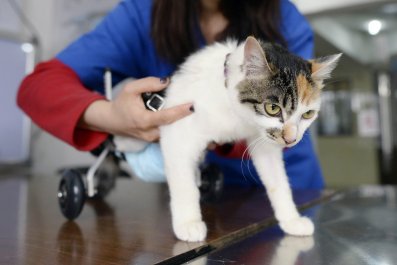The revolution is coming, and it is going to leave you rested and relaxed. The barricades you and I are going to storm, shoulder to shoulder, were thrown up by our relentless workaday lives, by the evil empire of stress, by the despotic tech monarchy whose foot soldiers are sleek devices beeping and dinging us into mindless compliance. We will break out of the Dickensian debtor's prison that is the modern American existence, take a deep, chakra-cleansing breath and discover that our body fat has dropped to 18 percent, which is good if not great.
This revolution, already underway, is led by a sexagenarian entrepreneur named Arianna Huffington, she of that online bazaar of regurgitated news, amateur blogging, corporate puffery and celebrity side-boob pics that bears her name. Having stepped away from The Huffington Post earlier this year, she has started Thrive Global, a wellness website that went live on the last day of November with indispensable life advice from the likes of actor Ashton Kutcher ("I Don't Bring My Phone Into the Bedroom") and Amazon founder Jeff Bezos ("Why Getting 8 Hours of Sleep Is Good for Amazon Shareholders"). You can also take an online wellness course, which features "instructors" like Kobe Bryant. As far as that goes, the website anticipates, and answers, a rather obvious question: "What do Arianna Huffington and Kobe Bryant have in common? They are both meditators, and they both value the power of sleep." OK, then. I'm enrolling as soon as I finish my course work at Trump University.
Huffington's convictions are as changeable as the monetary policy of her native Greece; what is constant is her bid for relevance, her yearning to be the capo di tutti capi of the Davos crowd. Having cycled through the varieties of American experience, Huffington has settled on the beloved national enterprise of peddling miracle cures to the masses. She does so online at Thrive Global; this December, she also opened a Thrive Global "pop-up" store in the resplendent, reclaimed heart of Manhattan's SoHo luxury shopping district, where 19th-century warehouses have been given over to more contemporary concerns like Band of Outsiders and Balenciaga. Up the block is a branch of SoulCycle, the beloved exercise studio that combines the psychology of cults with the latest in exercise faddism, for only $34 per sesh. If you think that's too much to pay to sit on an exercise bike and have commands shouted at you by an instructor vastly more fit than you'll ever be, your path to spiritual and physical salvation won't be easy.
Huffington's pop-up store will disappear in late January, though Thrive Global will continue to thrive online. The "pop-up" designation has become a cliché meant to evoke a casual, by-the-bootstraps approach to mercantilism, just a bunch of crazy kids throwing all their savings and energy into a gluten-free croissant bakery.
It is my duty to inform you that there is nothing even remotely casual or freewheeling about Thrive Global. Whole wars have been waged with less calculation—and less at stake, at least according to Huffington. Entering the store, you're greeted by a wall on which a quote is stenciled welcoming you with the following admonition: "Let's all go from surviving to thriving." Notice the first-person plural—Huffington, worth $50 million, is just another working stiff like you and me. But she has a secret, and she will share it—provided, of course, you share your credit card number. She'll even take Discover.
The cruel irony is that Huffington's employees had a pretty tough time just surviving while she ran what was, by all accounts, the most miserable newsroom in Manhattan. As an anonymous HuffPo employee described it in an infamous Gawker diatribe from 2015, "Hell Is Working for the Huffington Post."
Thrive was the name of Huffington's 2014 book, written seven years after she suffered a collapse caused, apparently, by exhaustion. The book introduces Western civilization to something called the Third Metric, a means to transcend the usual tropes of wealth and power and rediscover "our sense of delight in the mysteries of the universe." To stoke this sense of universal delight, Huffington opens the book with a reference to her placement on Time 's 100 Most Influential People list, which seems like a pretty First-Second Metric move, before moving onto Chernobyl and Three Mile Island, which she says were caused "at least partially" by a lack of sleep. Nuclear scientists may quibble with that simplistic assertion, but a book about napping and meditation will sell a lot better than a book about faulty graphite-moderated reactors and rogue pressure-relief valves.
Thrive spawned the Thrive Conference, where you can bask in the wisdom of some of the brightest stars in Huffington's celebrity-studded galaxy: MSNBC host Mika Brzezinski, the University of Pennsylvania productivity/creativity "scholar" Adam Grant and, of course, the crown-prince of monetized enlightenment, Deepak Chopra. As far as I can tell, what one learns at Thrive is a jambalaya of optimism and fetishized orientalism. Facts are treated like protesters at a Trump rally. At the 2014 Thrive conference, celebrity nutritionist Dean Ornish told the audience, "When you change your lifestyle, it changes your genes, over 500 genes, in just a few months." It is true that epigenetics—the way genes express themselves—is a fertile field of study, one where Ornish has done some promising work. Yet to turn his findings into such a cocksure marketing pitch comes close to abrogating the Hippocratic Oath. If a first-year graduate student in biology made the same pronouncement, he would be made to eat an undissected frog.
Copies of Thrive are placed in stacks around the bright, exceptionally well-appointed space of Thrive Global. That book competes with a newer one by Huffington that updates her thinking on naps. Like Thrive, with its evocations of nuclear meltdown, The Sleep Revolution begins with a cheerful episode, in this case the suicide of a purportedly overworked Goldman Sachs analyst in San Francisco. The central idea of The Sleep Revolution is not even remotely revolutionary: "Getting the right amount of sleep enhances the quality of every minute we spend with our eyes open." In the mode of Malcolm Gladwell, Huffington (or, more aptly, loyal ghostwriter Roy Sekoff) stuffs this meager goose of an idea full of social science research that seems to bolster her point.
As in the works of Gladwell—and those of his apparent acolyte, the University of Pennsylvania's Grant—the answer is always easier, and more readily available, than you could have possibly thought. In the midst of the Thrive store, there is some kind of light sculpture made by students from the Parsons School of Design. A printed legend to the work contains the perfect encapsulation of Huffington's brand of pseudo-scientific self-help: "There is no light at the end of the tunnel. There is only you. You are the light."
Got that? Good. Now go take a nap.
But it's not quite that easy, is it? How, exactly, do we thrive and sleep in this crazy world of ours? Thrive Global supplies the answer: by buying stuff from Thrive Global. There are several virtual reality devices, which a helpful Thrive Global employee helped me slip over my face. I was immediately greeted by a three-dimensional apparition of U2 lead singer Bono, who promptly began to croon. What this has to do with thriving, I don't know. I do not like U2 and thus tried to stop Bono's singing, which I did by jerking my head back and forth in hopes of activating the headset's controls. This was quite stressful. The VR program was also loaded with a meditation exercise guided by Chopra. In an online review, an apparently genuine fan of the guru's foray into digitally mediated reality described it as a "disembodied voice, emanating from a floating Being/Shape that gently pulses through geometric formations, ushers me through a chakra fueled journey into Consciousness." If that sounds relaxing, you might also enjoy doing yoga to The Shining.
Should virtual reality not lead into the kind of Lululemon-clad mindfulness Huffington has in mind, you can experience the Energy Pod, which sits near the entrance to the shop like a futuristic throne. Again, a kind and patient Thrive Global employee helped me into this high-tech chair, which is supposed to induce workplace napping and thus bring about the sleep revolution in small increments—the sleep low-grade guerrilla-warfare campaign, if you will. If the dentist's chair is your calm and happy place, you'll probably enjoy the EnergyPod. A sensory-deprivation shield is placed over your head (a marvelously efficient means of inducing claustrophobia), and the chair begins to vibrate. For a moment I was indeed transported—to the middle seat of a medium-body passenger jet going through turbulence over the Rocky Mountains. The price for the EnergyPod wasn't listed at the pop-up, but it's available online: $10,000. That preposterous price is next to the kind of quantity counter you use when buying diapers on Amazon.
For someone who preaches disconnecting and living in the moment, Huffington sure wants to sell you a lot of gadgets and apps, all of them intended to measure and moderate physical processes, to correct the panoply of physiological deficiencies you were born with or developed as a result of eating poorly or sleeping poorly or doing something else wrong, like not living in Manhattan or Santa Monica.
Among the digital tools peddled by Huffington is the Muse brain-sensing headband, a silly-looking $249 device that supposedly "provides you with real-time audio feedback on what's happening in your brain when you meditate," and the Spire "mindfulness and activity tracker," which promises to offer "insight into when you're tense, focused or calm," for only $99.95. Not only are these toys expensive; they're dangerous, offering the illusion of psychic salvation that is as easy as updating the operating system on your iPhone. If you're in serious distress, you should see a psychiatrist. If you've had an immensely crappy day, go for a jog or have a glass of wine or binge-watch Homeland. Then again, I fear that the kinds of people who will buy the Muse headband are the kinds of people who think vaccines cause autism—i.e., beyond reason, wine and even television.
Just in case you haven't gone utterly insane with techno-hypochondriasis, don't forget to pick up the FOODsniffer, a $129.99 device that can tell you whether a piece of food is spoiled. This is a true triumph of technology, although I'm aware of another device that can do the same totally gratis: your nose.
Some portion of Thrive Global is devoted to pushing high-end lifestyle products you could easily find at Bed, Bath & Beyond or another high-end department store, without the endless blather about how bath salt "melts away the day's tensions and induces calmness." Nothing here is a soft sell, not even the chamomile lavender candle by Lafco, whose products Thrive Global claims can "change everyday tasks into fresh and luxurious experiences," nor the Matcha teas that "are a soothing ritual that leaves us feeling energized, attentive, calm and productive." All that from some hot, flavored water!
Something should also be said about the Phone Charging Bed. What should be said about it, I don't know, but I know that it costs $100. The phone bed has been widely mocked online, which is good. But let me just add that if you're the kind of individual who thinks a glass-encased slab of circuitry deserves to be tucked in like a newborn babe, you likely have problems that even Arianna Huffington cannot solve. You can also have the iPhone read Goodnight Smartphone, an audiobook version of the children's classic Goodnight Moon performed and written by Huffington herself. Isaac Chotiner of The New Republic once observed that Huffington is "painfully unfunny," and Goodnight Smartphone very much proves that.
Downstairs at the Thrive Global store is a relaxation lounge, a dark room with chairs and couches (elsewhere in the store is a sleep sanctuary, i.e., a bed). It's like being back in the womb, only with upholstery lovingly handwoven by Guatemalan children. Just don't let your gaze travel to the bookshelf, where some of the titles might spoil your mood. One of these is The Gene, by Siddhartha Mukherjee, who won a Pulitzer for his history of cancer. Genetics is fascinating, but not a topic I associate with meditation or mindfulness. Also jarring, if somewhat less odd, were titles by David Agus, the renowned oncologist. He has recently become something of a celebrity, but his main occupation remains illness, not wellness.
As I wandered back upstairs, it struck me just how much of what Huffington was selling was tinged with the prospect of bodily oblivion: a $249 genetic test for cancers, for example, or the $89 uBiome Gut Explorer (which involves, if you go the whole microbiotic hog, sending away samples of poop and genital-area swabbings), the Mint Oral Health Monitor ($99), and a subscription to Doctor on Demand, which can summon a medical professional on your iPhone ($49). Even the art on the walls started to radiate unease. The selections consist almost entirely of pointillist collages by Isabella Huffington, one of Arianna's two daughters. These seemed inoffensive enough at first, if not entirely my thing. But as I spent more time at the Thrive Global store, the more Huffington the Younger's collages came to look like microscopic slides of cancerous tissue.
I wasn't surprised to later discover that the penthouse of the building housing the SoHo pop-up is where actor Heath Ledger died of a drug overdose in 2008. This is obviously just a coincidence, and yet a kind of morbid quality hangs about the place, which was once also home to the Dust Exterminator Co., a business I suspect Huffington, she of pure mind and body, would have endorsed.
Let's real-talk for a quick minute here. What Arianna Huffington is running is a well-appointed death cult. She will stave off your mortality while constantly terrifying you with the prospect of death, which is why her books begin with nuclear accidents and suicides. In Thrive, she writes that "eulogies are, in fact, very Third Metric," because "a eulogy is often the first formal marking down of what our lives were about—the foundational document of our legacy. It is how people remember us and how we live on in the minds and hearts of others." You, for example, might be remembered as a good parent or a gracious dinner-party host, while Arianna Huffington will be remembered for bringing spiritual tranquility to millions, making Time's 100 Most Influential People list and taking immensely restful naps in her $10,000 nap chair. It's all the same, sort of.
I end with an admission. Shorn of Huffington's corporatist shamanism, that eulogy business is more or less true: Focusing on mortality can make us more aware of the lives we live and how we live them. It is also true that we should get some sleep, and not always look at our phones, and eat kale at least once a year (it isn't horrible if fried), and go for a run when it's nice out and try to not shout at people who take up two seats on the 4 train. These things were true before Huffington came down the mountain, artisanally hewn revelatory tablets in hand. They will be true long after her fatuous "revolution" has run its course.



